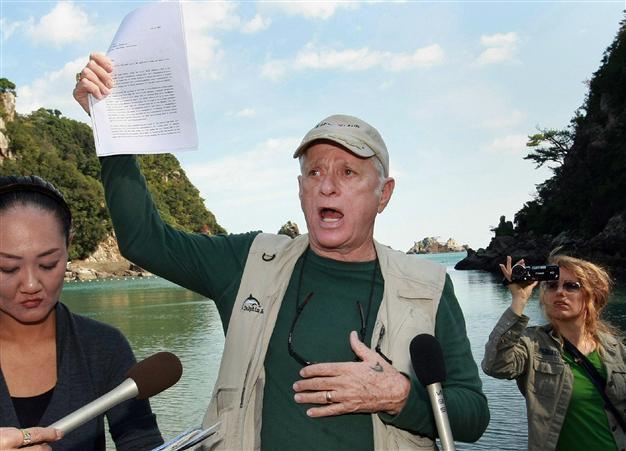Japan arrests 'Flipper' trainer as dolphin hunt starts
TOKYO - Agence France-Presse

This file photo taken on November 2, 2010 shows US dolphin activist Ric O'Barry (C), the central figure in the Oscar-winning documentary "The Cove", protesting against dolphin hunting, at a public hall in Taiji, in Wakayama prefecture, western Japan. AFP Photo
Japanese police said on Sep. 1 they had arrested US animal rights activist Ric O'Barry, who trained dolphins for the TV show "Flipper", near the town of Taiji as it kicked off its controversial dolphin hunt.Bad weather pushed back the first dolphin-killing of the six-month season which opens on September 1 every year, a local fisheries association official said.
O'Barry, 75, was arrested on Aug. 31 for allegedly failing to carry his passport after being stopped by police.
"We had a report that he was drinking alcohol and driving, so officers were dispatched to find him and check his breath," a local police spokesman told AFP.
"He smelled like alcohol, but the reading on the (breathalyzer) was not high."
Police took him into custody for not having a passport in his possession, the spokesman said.
O'Barry, who appeared in the Oscar-winning documentary "The Cove" which drew worldwide attention to the small town of Taiji, has frequently visited the community to protest against the dolphin hunt.
O'Barry, who found fame first in the 1960s for catching and training five dolphins for the well-known TV series "Flipper", has latterly fought against keeping the mammals in captivity.
He will likely have to pay a fine of up to 100,000 yen ($830) and could be detained for up to 48 hours before police decide how to proceed, the spokesman said.
But he added it was unlikely O'Barry would be held longer than two days or face fresh charges.
Police have dispatched more officers to the town for the hunt in anticipation of possible clashes between locals and anti-hunt activists.
Immigration authorities have denied entry to anti-whaling demonstrators at airports, according to conservation group Sea Shepherd.
In the annual catch, people from the southwestern town corral hundreds of dolphins into a secluded bay and butcher them, a scene thrust into the global spotlight in "The Cove".
Environmental campaigners visit the town every year now to watch the hunt.
Increasing the pressure on Japan, the World Association of Zoos and Aquariums (WAZA) suspended its Japanese chapter (JAZA) in April for using dolphins caught in Taiji. JAZA later voted to stop using them.
Defenders of the hunt say it is a tradition and point out that the animals are not endangered, a position echoed by the Japanese government.
They say Western objections are hypocritical and ignore the vastly larger number of cows, pigs and sheep butchered to satisfy demand elsewhere.
But critics of the practice say there is insufficient demand for the animals' meat, which in any case contains dangerous levels of mercury.
They say the hunt is only profitable because of the high prices live dolphins can fetch when sold to aquariums and dolphin shows.
















